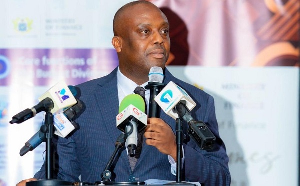Accra, April 1, GNA - Panellists at the dissemination of the State of the World's Children Report 2009 on Wednesday identified socio-cultural practices, lack of skilled manpower, essential health care, staff attitude and lack of motivation as some of the factors contributing to maternal and neonatal death in the country. The 2009 Children's Report on the theme; "Unseen and Uncounted Maternal and Neonatal Deaths" examines critical issues in maternal and newborn health, underscoring the need to establish comprehensive continual of care for mothers, newborns and children. The report outlines key paradigms in health programming and policies for mothers and newborns and examines partnerships and collaborative initiatives aimed at improving maternal and neonatal health.
The panellists contended that there was the need for a concerted effort to reduce maternal and neonatal deaths and ensure that motherhood became safe.
The panellists, Dr. Elias Sory, Director General of Ghana Health Services (GHS), Dr. Chris Opoku Fofie, Obstetrician/Gynaecologist at the Wa Regional Hospital, Nana Oye Lithur, Regional Coordinator for the Commonwealth Human Rights Initiative, Dr. Nelson Damale, Consultant, Korle-Bu Teaching Hospital and Dr. Gloria Quansah Asare, Director Family Health, GHS, agreed that the socio-cultural aspects of the problem needed urgent attention.
Dr. Fofie admitted that some socio-cultural issues were causes of death but was quick to place emphasis on lack of essential care and called for motivation for health workers in deprived areas. Dr. Sory said the GHS had good policies and interventions in place but lack of funds continued to be a problem and called on all stakeholders to commit themselves to the case of a safe motherhood due to the multi-sectoral nature of the problem. Nana Oye said lack of statistics on the maternal and neonatal death was worrying and noted that where life was at stake human rights can be quashed to enable her to live. She, however, noted that where socio-cultural practices were involved counselling should be given to family members to avoid being rejected by them.
Dr. Damale noted that 15 per cent of all pregnant women were likely to have complications and there was the need to always be combat ready to cater for such emergencies. "Resources should be made available 24/7 and set target as a nation. We also need a well stocked blood bank always and get blood where it is needed most. Haemorrhage in women really is not the problem but how to replace it is the crucial issue". He noted that money used for extravagant lifestyles of "big men" should be channelled into the health system to save the lives of women. Dr Asare also noted that there were lots of interventions but it was unfortunate that things were not working and called for the involvement of all stakeholders from all Ministries, Department and Agencies to get on Board. She agreed that sometimes the attitude of staff contributed to deaths but noted that praise should be given to those who worked tirelessly to save lives. Dr Asare added that there was the need for re-orientation of Traditional Birth Attendants (TBA). Women and Children Affairs Minister, Akua Sena Dansua said achieving the MDGs Four and Five remained a challenge especially with high numbers of maternal and neonatal deaths despite inventions put in place.
She said it was equally worrying that only 15 per cent of births in the country was done by skilled attendants and attributed this to lack of access to health facilities. Declaring this problem as a national emergency was a step in the right direction considering the fact most of these maternal and neonatal deaths can be avoided, she said. Ghana, she said, needed healthy women and children to ensure that the human resource base was solid and called for the empowerment of women at all levels to ensure that women and children were safe. UNICEF Ghana Representative, Dr. Yasmin Ali Hague, said the spotlight for the 2009 report was on the mother and the new born, factors that affected their survival, the solutions and actions that need to be taken to ensure that pregnancy and child birth had a healthy outcome.
The report, she said, highlighted the fact that 95 per cent of all maternal and 90 per cent of all new born deaths occurred in developing countries while West and Central Africa had the highest maternal mortality ratios in the world and accounted for 30 per cent of all maternal deaths.
Ghana had varying estimates ranging from 214-560 per 100,000 live births, she said, and added that estimating maternal mortality was technically difficult because communities or facilities often did not identify new born or neonatal deaths.
The dissemination of the report calls for focused and effective action and investment to ensure that there is an environment that enables women and their newborns to have access to quality services and that these services are available to those who need it the most and that they are timely and provided in a manner that respects human dignity. Majority Leader Alban Bagbin noted that there was the need for parliament to educate the public on procedures of the House and how they can lobby to get issues of national importance carried out. He said it was very sombre to reflect on maternal and neonatal issues and noted that it was unfortunate that it was virtually impossible to get health professionals to sit and deliberate on such issues at the constituency levels. He stressed the need to educate and create awareness as well as develop messages that would put people on their toes. 1 April 09
General News of Wednesday, 1 April 2009
Source: GNA












